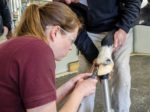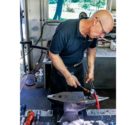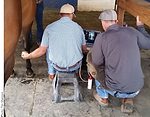Advertise Follow Us
Items Tagged with 'Veterinarian-Farrier Relationship'
ARTICLES
Friday’s Farrier Facts & Figures
4 Tips to Build Up Your Team
Veterinarians and farriers have different strengths that can complement each other and benefit horse clients.
Read More
Understand Farrier Terminology and How it is Used
Farrier Bob Pethick finds veterinarians can hurt a farrier’s reputation by using incorrect terminology in the absence of understanding with the client.
Read More
Advice from Farriers Who Work the Most with Veterinarians
Several farriers who work with veterinary colleagues on a daily basis offer opinions on improving veterinarian-farrier relationships.
Read More
How a Successful Farrier and Veterinarian Relationship Should Flow
To help horses, both the farrier and veterinarian must recognize specific areas of responsibility and have open communication.
Read More
EVENTS
Live
Veterinarian/Farrier Happy Hour
11/20/17 6:00 pm EST
Brandon Equine Medical Center
605 E. Bloomingdale Ave.
Brandon, FL
United States
Live
Southern Farrier's Assn. Spring Clinic
4/20/19 9:00 am EST
Harrison County Equestrian Complex
15321 County Farm Rd
Gulfport, MS
United States











